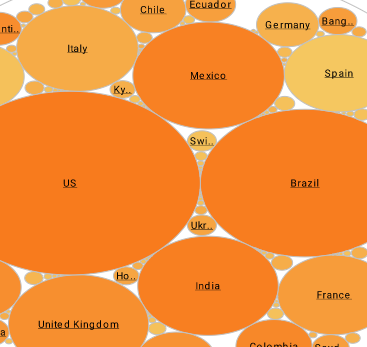What KPIs and Analytics Do Vendor Analysts Use?
Vendor analysts are experts who focus on assessing the goods and services provided by suppliers in a given market. Examples of industries covered are cloud computing, data center infrastructure, digital workplace, networking, security, and business intelligence.
Their objective is to provide their clients information about these suppliers' performance levels so they can make the best decision on whom to choose.
Vendor analysts employ key performance indicators (KPIs) and analytics as crucial tools to do this. We will examine the metrics and analytics used by vendor analysts to evaluate the performance of vendors in this post.
| #1 Ranking: Read how InetSoft was rated #1 for user adoption in G2's user survey-based index | Read More |
Key Performance Indicators (KPIs)
Key performance indicators are measurements that are used to assess how well a certain procedure or activity is doing. KPIs are used by vendor analysts to assess a vendor's performance across a range of metrics, including sales, marketing, and customer service. Vendor analysts employ a number of critical KPIs, including:
- Sales Growth: Vendor analysts utilize sales growth as a crucial KPI to assess vendors' revenue development. By comparing the income earned during the current period with the revenue generated during the preceding period, this KPI is computed. A vendor that is effectively selling its goods or services and acquiring market share would have a high sales growth rate.
- Customer Acquisition Cost (CAC): The expense of obtaining a new client is known as customer acquisition cost. This KPI is used by vendor analysts to assess the success of a vendor's marketing and sales initiatives. A low CAC suggests that the vendor is successfully bringing in new clients, while a high CAC can suggest that the seller is overspending on marketing and sales.
- Customer Lifetime Value (CLV): The entire income a vendor might anticipate receiving from a client over the length of their relationship is known as customer lifetime value. CLV is a metric used by vendor analysts to evaluate the long-term profitability of a vendor's clientele. A high CLV shows that the vendor is successfully maintaining clients and producing steady income.
- Net Promoter Score (NPS): Net Promoter Score is a metric used to gauge client happiness and loyalty. NPS is a metric used by vendor analysts to assess how probable it is for consumers to refer a vendor's goods or services to others. A high NPS indicates that the vendor has a foundation of devoted clients who are inclined to recommend them to new customers.
- Churn Rate: The rate at which clients discontinue doing business with a provider is known as the churn rate. The success of a vendor's customer retention tactics is assessed by vendor analysts using the churn rate. A high percentage of client turnover may be a sign that the seller is having trouble keeping consumers and that its goods or services need to be improved.
- Market Share: Market share is the portion of a vendor's total sales that are attributable to that market. Market share is a tool used by vendor analysts to assess a vendor's position in the market. The vendor is a market leader and has a strong position in the industry if they have a large market share.
- Return on Investment (ROI): The profitability of an investment is gauged by return on investment. ROI is a metric used by vendor analysts to assess the success of a vendor's sales, marketing, and other initiatives. A high ROI shows that the vendor is making a significant profit from its investments.
 |
Learn about the top 10 features of embedded business intelligence. |
Analytics
Analytics is the practice of analyzing data to understand how well a company is doing. Analytics are used by vendor analysts to examine data from a variety of sources, including as sales data, customer data, and market data. Vendor analysts use a number of important analytics, such as:
- Sales Analytics: Sales analytics is the process of examining sales data to learn more about customer behavior, sales patterns, and revenue growth. Sales analytics are a tool that vendor analysts use to assess a vendor's sales methods and locate chances for revenue development.
- Customer Analytics: Customer analytics is the process of examining customer data to learn more about the behavior, preferences, and demands of the customer. Customer analytics are used by vendor analysts to define customer categories, comprehend client preferences, and create specialized marketing plans.
- Marketing Analytics: Analyzing marketing data to learn more about the efficacy of marketing efforts is known as marketing analytics. Vendor analysts utilize marketing analytics to assess the return on investment of marketing efforts, pinpoint problem areas, and enhance marketing tactics.
 |
Learn the advantages of InetSoft's small footprint BI platform. |
- Financial Analytics: In order to understand a vendor's financial performance, financial analytics entails evaluating financial data. Financial analytics are used by vendor analysts to assess financial risk, cash flow, and profitability.
- Web Analytics: For the purpose of understanding website performance, user behavior, and customer engagement, web analytics entails examining website data. Web analytics are used by vendor analysts to find ways to enhance website performance and user interaction.
- Predictive Analytics: In predictive analytics, patterns are found in data and future consequences are predicted using statistical algorithms, machine learning, and data. Predictive analytics is a tool used by vendor analysts to estimate revenues, discover consumer patterns, and assess the success of marketing initiatives.
- Competitive Analytics: Analyzing competitor data to understand their advantages and disadvantages, positioning in the market, and pricing tactics is known as competitive analytics. Competitive analytics are used by vendor analysts to assess how well vendors are doing in comparison to their rivals and to spot possibilities to achieve a competitive edge.



